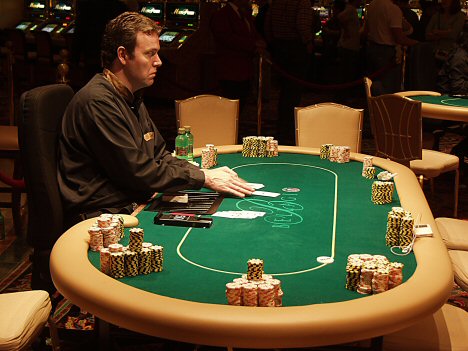The Future of Online Poker in Australia
Someone is trying to fuck with Australian online poker players. In my last article, I discussed poker’s ‘Black Friday’ – the banning of online poker in the USA. In that piece, I was relatively optimistic about the future of online poker in Australia, believing that there were too many big issues faced by the Government at the moment for them to concern themselves with the relatively trivial matter of enforcing the grey areas of online gaming laws. Indeed, enforcement of online gaming restrictions was never something any government agency seemed particularly interested in.
It looks like I may have been wrong, for two reasons: firstly, I underestimated the extent to which Australian authorities like to ape the actions of their American counterparts, and second, I didn’t foresee sections of the Australian media deciding to make online gambling an issue worth reporting.
Unfortunately, the Murdoch-owed media in Australia (in particular The Australian and the Courier Mail) have run a number of articles that have discussed the non-enforcement of the Internet Gambling Act in Australia, in particular in regard to online poker. This culminated in a recent article in the Courier Mail, reporting that Australian authorities – much like our American counterparts have just done – are considering cracking down on online poker. Apparently the Australian Crime Commission has requested the Australian Federal Police to ‘go after’ the websites offering gaming services to Australian customers.
To be fair, this is based on law: an anachronistic, idiotic, morally redundant piece of legislation – the Internet Gambling Act. The IGA was introduced in 2001 by that fool John Howard, and essentially prohibits most forms of online gambling (don’t you love the irony of so-called ‘liberals’ resorting to prohibition so easily?). One of the problems for poker players is that our game – in the minds of the general public – is often put in the same basket with mindless gambling such as online roulette or craps. Let’s be clear, the IGA does not make it illegal for Australians to gamble online; but, it makes it illegal for gaming sites to offer Australians a gaming service. There are some exceptions – the IGA allows wagering on sporting events; horse, harness and greyhound racing, and lotteries. However, all forms of casino games, plus bingo and the pokies are banned. The legislation lumps poker in with casino games.
Things are no better for Australian poker players on the other side of politics, apparently the Communications Minister, Stephen Conroy (who recently was humorously described as a ‘factional dalek’ in the press) is considering ways to enforce the legislation. So for the short term, things have started to look shakier for online poker.
As for the long term I will start with a point I made in my previous article:
In any case, the Australian Productivity Commission (which recommended the ‘pre-commitment’ cards for the pokies) recommended that online poker have all these legal grey areas removed and be fully regulated. The Commission made this recommendation as it found poker – of all forms of gaming – least susceptible to problem gambling. No surprise, given poker is a game of skill based on patience, mathematics, logic, game theory and human psychology. Not the first choice for someone with a gambling problem, and not the sort of pursuit that gives the same nihilistic rush as a poker machine or roulette wheel.
Andrew Wilkie heads the parliamentary committee on Gambling Reform, which has been tasked with providing a response to the productivity commission report. He is someone, from my observation of his public statements, who seems to be instinctively against prohibition or blanket bans (he opposes the internet filter, for example). Mr Wilkie repeatedly quotes the Productivity Commission when making his arguments against the poker machine industry. While Australia clearly has a serious gambling problem (we lose more, per capita, on gambling each year than any other country in the world), many of us in the poker community wish he’d look more broadly at the report he so enjoys quoting, and that this enquiry take a balanced and nuanced approach in making its recommendations.
The report by the Productivity Commission is actually a good one, by the way. There were not many recommendations they made that weren’t backed up by common sense and solid evidence. As such, it is a shame that the political parties and the independents are focusing on only one part of the report: the section on dealing with problem gamblers in relation to poker machines.
Elsewhere in the same report, The Productivity Commission lays out three options for the future of online poker, which I happen to think are the three most likely scenarios. These are as follows: maintain the status quo (weakly enforced prohibition); a more strictly imposed prohibition (as may be upon us soon); or a 'managed liberalization' of online poker with a view to expanding this to other forms of gaming after a 'test' period. The latter is obviously the best for the online poker industry and is the option recommended by the Commission. It is also, if you look at the evidence, the best for punters, problem gamblers and the government.
Let’s look at the options:
Status Quo: continued prohibition with no enforcement. This doesn’t really help any of the stakeholders: the industry, problem gamblers or the average punter. For the industry, there will be continued uncertainty and it could cause some of the more reputable sites to stop taking Australian customers. It means that there will be no regulations for these sites with regard to the very small number of ‘problem’ poker gamblers, and it means that there will continue to be no obligation to pay any taxes on profits made from Australian players. Prohibition means that the poker sites have no incentive to offer support services, or even track problem gamblers. For the average punter it leaves a question mark over the deposits they have in online poker sites giving them uncertainty over how easy it will be to cash out. It also means that those players earning a living from online poker (which is legal for them to play, let’s remember) will have this ongoing threat hanging over their livelihoods. Everyone loses.
Strict Enforcement: the Australian Federal Police crackdown on the poker sites. Take all the problems I’ve outlined above and multiply them by a factor of 10. Strict enforcement will knock out all the credible sites (like PokerStars and FullTilt poker) and leave us with the charlatans and gangsters of the virtual world. There will be no certainty around deposits or the integrity of the games. The average punter will stay away from these sites and the online poker economy will die. The only people left playing will be the small number of gambling desperados who will continue to find ways to spew their money away no matter what the regulatory environment.
Managed Liberalisation: as recommended by the Productivity Commission. Put simply, everyone wins – the government gets increased tax receipts, problems gamblers will be protected by technologies designed to mitigate abuse, and poker players will have certainty around their online poker accounts and (for professionals) about their future sources of income. It makes sense on all counts. It would not be too difficult for PokerStars, for example, to set up an Australian subsidiary and begin paying tax on the profits made from the Australian slice of their online market. The sophistication of their online software is such that I have little doubt they could calculate the Australian share of their global market.
As to problem gamblers, the major online poker sites already have ‘self exclusion’ options for their players (that is, a player can choose to ban themselves for a day, a week, a month or a year), and they have technologies that track erratic betting. I have read a number of stories on poker forums of players receiving emails or phone calls from the major poker sites after big losses asking them to consider dropping down stakes or to seek counseling. The Productivity Commission rightly points out that it is actually easier to track problem gamblers online than it is live – there is no way to hide or cover up the results. It is relatively easy for poker sites (if they have not got it already) to implement the software requirements around tracking problem gamblers advocated by the Commission.
Finally, the average punter wins on all counts. The games are guaranteed to be clean, run by the credible sites (presumably they will go through some sort of accreditation process set up by regulation); deposits are safe and livelihoods are not threatened.
So, I hate to say it but in the short term I’d recommend if you have a large amount of money online that you move it to your Australian bank account. I initially resisted the urge to do so after events played out in the United States, but the latest round of stories in the Australian papers are disconcerting to say the least. I’ve taken all my funds out, save about a grand in each account so I can keep playing tournaments. The major sites – like PokerStars – will probably find a way to get the money back to players should the government shut them down (as they have managed to do in the US), but it could take some time. I’m not sure the same could be said of some of the smaller sites. Some common sense is required here – if you have a large amount of your personal net worth in an online poker account, stop being a fool and put it in a bank.
The next 3 to 6 months will be interesting. There is a faint chance that the Gambling Reform Committee will recommend managed liberalization, but I put that at around 5%. Aside from that I’d give the two remaining options: non-enforced and enforced prohibition about an equal chance of coming through, with a slight edge to the 'status quo' given the notorious difficulty of trying to ban things happening over the internet.
Which means the forecast for online poker is the bleakest it has been for some time.

